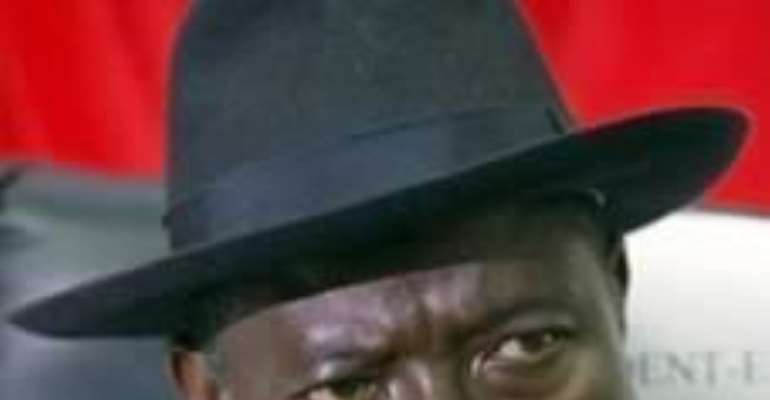FUEL: FINAL SHOWDOWN BEGINS – AS LABOUR VOWS TO IGNORE COURT ORDER

• Jonathan
All is set for the indefinite nation-wide strike, mass rallies and street protests organized by Labour and civil society groups to protest the January 1, 2012 removal of petroleum subsidy by the Federal Government. Fuel prices went up about 200 per cent as a result of the deregulation policy.
In Abuja, protesters, according to a statement issued by the Nigeria Labour Congress (NLC), Trade Union Congress (TUC) and civil society groups, were advised to converge at the popular Berger junction roundabout, which was chosen as the meeting point, by 8a.m everyday, starting from today.
Irrespective of President Goodluck Jonathan's weekend broadcast about his administration's plans to put in place some palliatives, Labour insisted on going ahead with the strike if the government fails to revert to the old pump price of N65 per litre of petrol.
It described the Saturday night Presidential broadcast as long in rhetorics and short on basic issues. Labour said the 'major anchor of the broadcast is that salaries of political office holders are to be cut by 25 per cent. But he (President) failed to tell us how much this will amount to. Is this a mere symbolic gesture or a fundamental contribution to economic recovery?'.
'The Nigeria Labour Congress (NLC), Trade Union Congress (TUC) and Civil Society Organisations inform the public that Berger roundabout is the meeting point for the anti-fuel price increase mass protests everyday at 8a.m from Monday, January 9, 2012.'
A statement signed by the NLC, TUC and civil society groups in Abuja made available to Daily Sun in Abuja, called on all residents of the Federal Capital Territory (FCT) to turn out en masse for the protest to force the Jonathan administration to return to the old pump price of N65 per litre. Until that is done, Labour maintained that it would not engage in any dialogue with the Federal Government or any committee as far as the removal of the petroleum subsidy is concerned.
The statement titled: 'President Jonathan's broadcast does not address the issue', signed by Owei Lakemfa, acting National General Secretary of the NLC and John Kolawole, Secretary-General of the TUC, said: 'The speech is undoubtedly due to the resistance of Nigerians to the unreasonable increase in PMS (petrol) prices and the planned national strikes scheduled to begin on Monday, January 9, 2012. So, the President having to address Nigerians, is the first gain of the planned protests.
'But the President's address follows the pattern of other documents (like the SURE Programme) by his administration; long in rhetorics and short on basic issues. For instance, the major anchor of the broadcast is that salaries of political office holders are to be cut by 25 per cent. But he failed to tell us how much this will amount to. Is this a mere symbolic gesture or a fundamental contribution to economic recovery?
Labour wondered how the President, who single-handedly increased the price of petroleum products, decided to hold talks with transporters He also talked about his administration holding meetings to review the cost of transport fares.
'We see this as a populist statement that has no foundation in reality. If a transporter, who used to buy petrol at N65 per litre now buys it between N141 and N220, what appeal can be made to him not to increase his fares by a high percentage? How do you 'deregulate' the economy and hope to regulate transport fares by private operators?
'The will of the Nigerian people must prevail over that of any government in power', the statement added.
Meanwhile, the NLC has described the order issued by the National Industrial Court (NIC) last Friday restraining it from embarking on its planned mass protest as a 'black market injuction', saying the NIC lacks the jurisdiction to interfere in labour matters. This is coming when reports of Boko Haram members have trooped into Abuja to carry out their darsdardly act. There were also security reports of the scarcity of cutlasses and knives at the Nyanya markets where suspected Boko Haram members are said to have purchased all the cutlasses in that market. Similarly, there was a large movement of non-northerners travelling out of Abuja, following the three-day deadline given by members of the Boko Haram sect to non-northerners to leave the north.
Several parks visited by Daily Sun in Abuja, namely, Zuba, Madalla, Karu, Jabi, Nyanya among others, showed a large number of Abuja residents travelling out of Abuja for fear of being killed by the Islamist sect. In a related development, investigations revealed that some major petrol stations in the satellite towns of Marraba, Nyanya and others in Asokoro, Garki Area Two, Area 11 and some parts of Jabi, Gwarinpa, among others in Abuja, remained closed yesterday.
No reason was given for the closure of these stations by the marketers. However, some of the security guards at the stations said that the reason may not be unconnected with the general security situation.
Meanwhile, the organising team that will co-ordinate the strike in Lagos State told repoters at NLC House, Lagos yesterday that all foreign airlines coming into Nigeria have been directed to neighbouring countries while the protests last.
